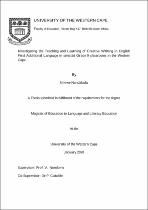| dc.contributor.advisor | Nomlomo, V | |
| dc.contributor.author | Nondabula, Nikiwe | |
| dc.date.accessioned | 2023-05-25T12:38:37Z | |
| dc.date.available | 2023-05-25T12:38:37Z | |
| dc.date.issued | 2020 | |
| dc.identifier.uri | http://hdl.handle.net/11394/10055 | |
| dc.description | Magister Educationis (Adult Learning and Global Change) - MEd(AL) | en_US |
| dc.description.abstract | Writing is an important aspect of language learning and a tool for assessment in Basic and Higher Education across the globe. Learners need to acquire proficient writing skills to learn and to demonstrate their knowledge and creativity. Given the importance of creative writing
in expressing one’s thoughts, emotions and imagination, this study sought to investigate how creative writing was taught through the medium of English First Additional Language (FAL) to Grade 9 learners in one primary school in the Western Cape province. It also sought to
observe and analyse the teaching strategies employed by teachers in creative writing to Grade 9 learners who were isiXhosa home language speakers, and who were taught all the subjects (except isiXhosa language) through the medium of English (FAL). Through the lens of Vygotsky’s Social Constructivism Theory, this study explored how the learners’ social context and language played a role in the teaching-learning process. The Social Constructivism theory assumes that the home environment is a primary | en_US |
| dc.language.iso | en | en_US |
| dc.publisher | University of the Western Cape | en_US |
| dc.subject | Creative Writing | en_US |
| dc.subject | English | en_US |
| dc.subject | Essays | en_US |
| dc.subject | First Additional Language (FAL) | en_US |
| dc.subject | Literacy Skills | en_US |
| dc.title | Investigating the Teaching and Learning of Creative Writing in English first additional language in selected grade 9 classrooms in the Western Cape | en_US |
| dc.rights.holder | University of the Western Cape | en_US |

